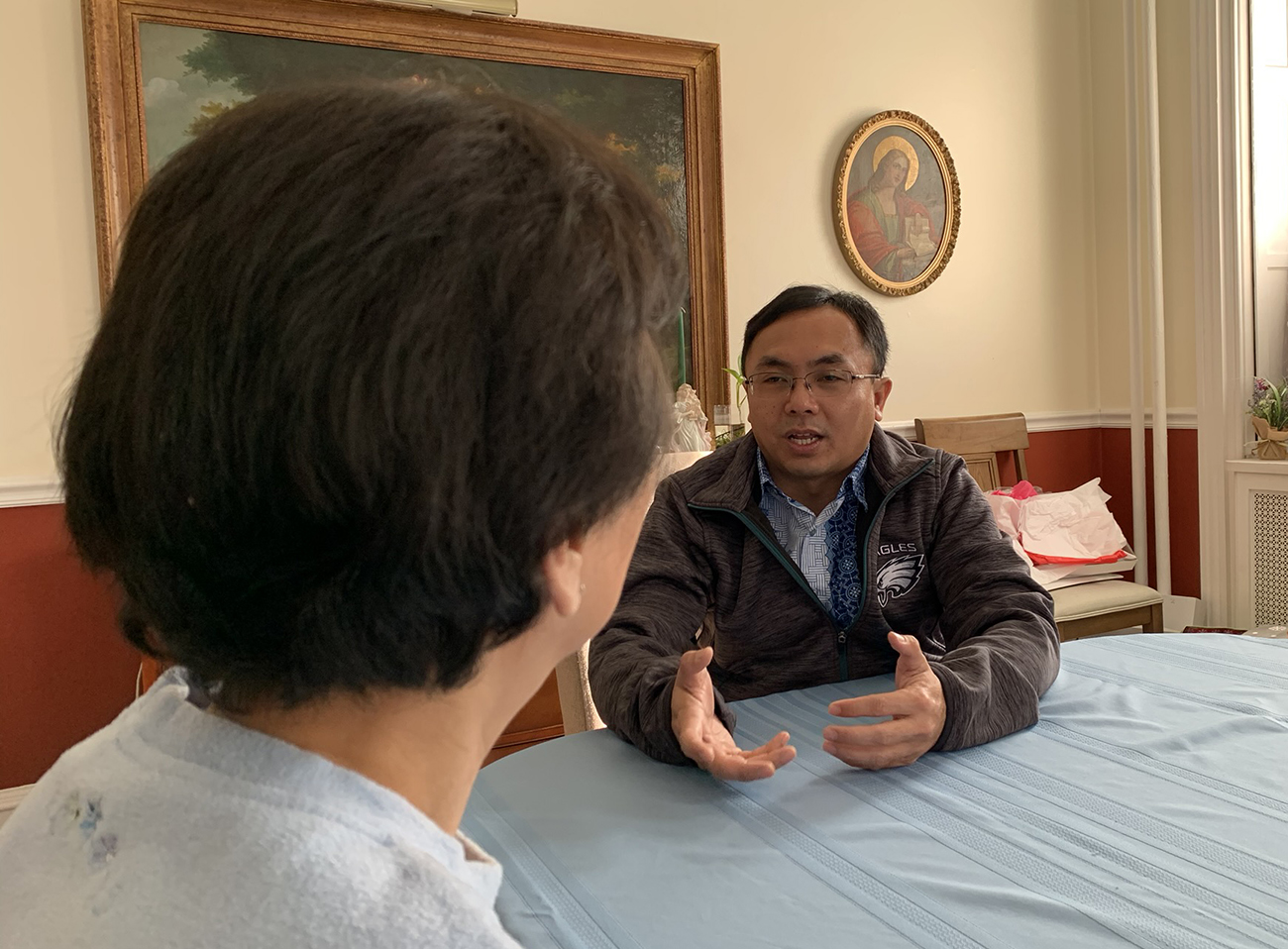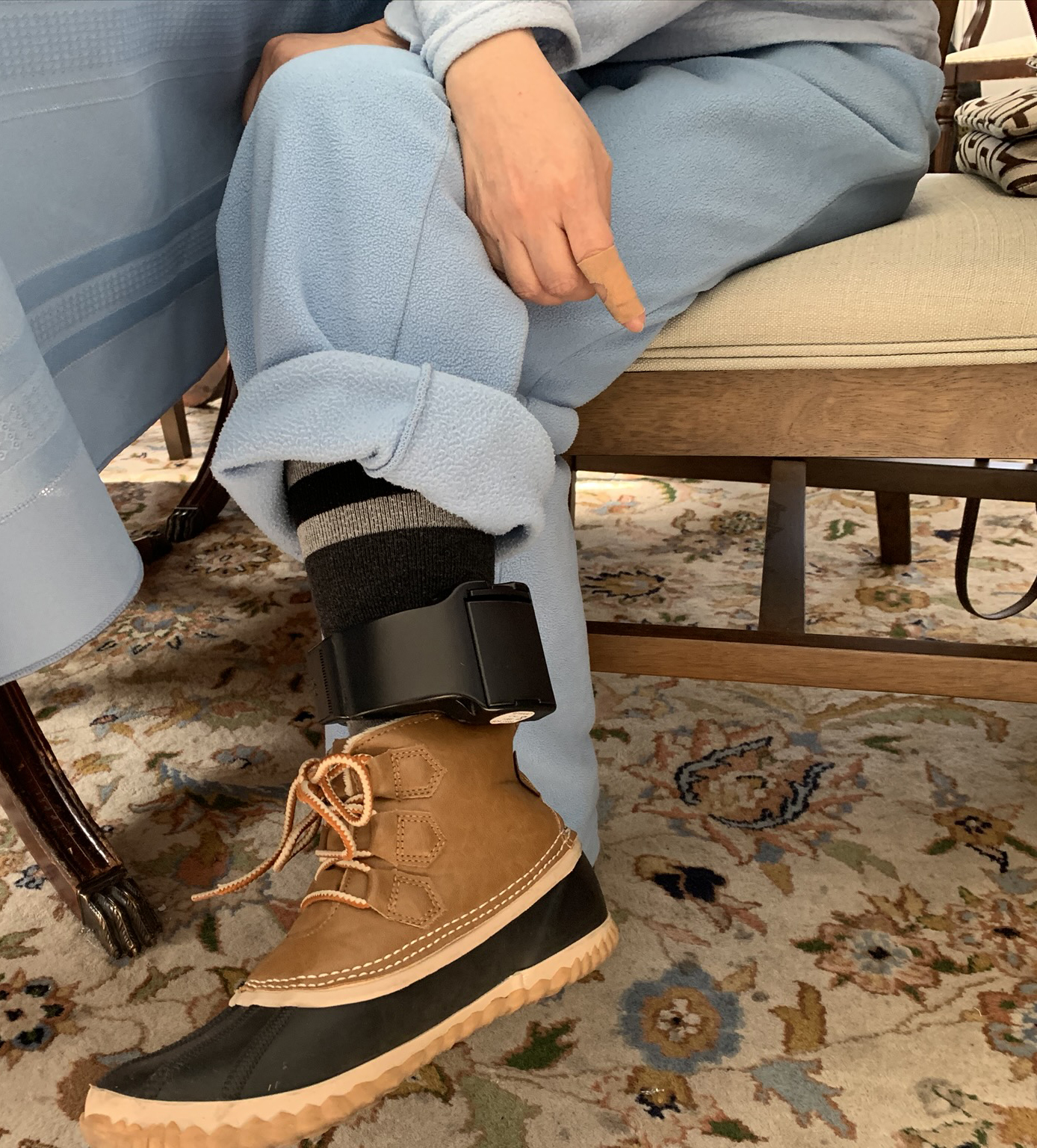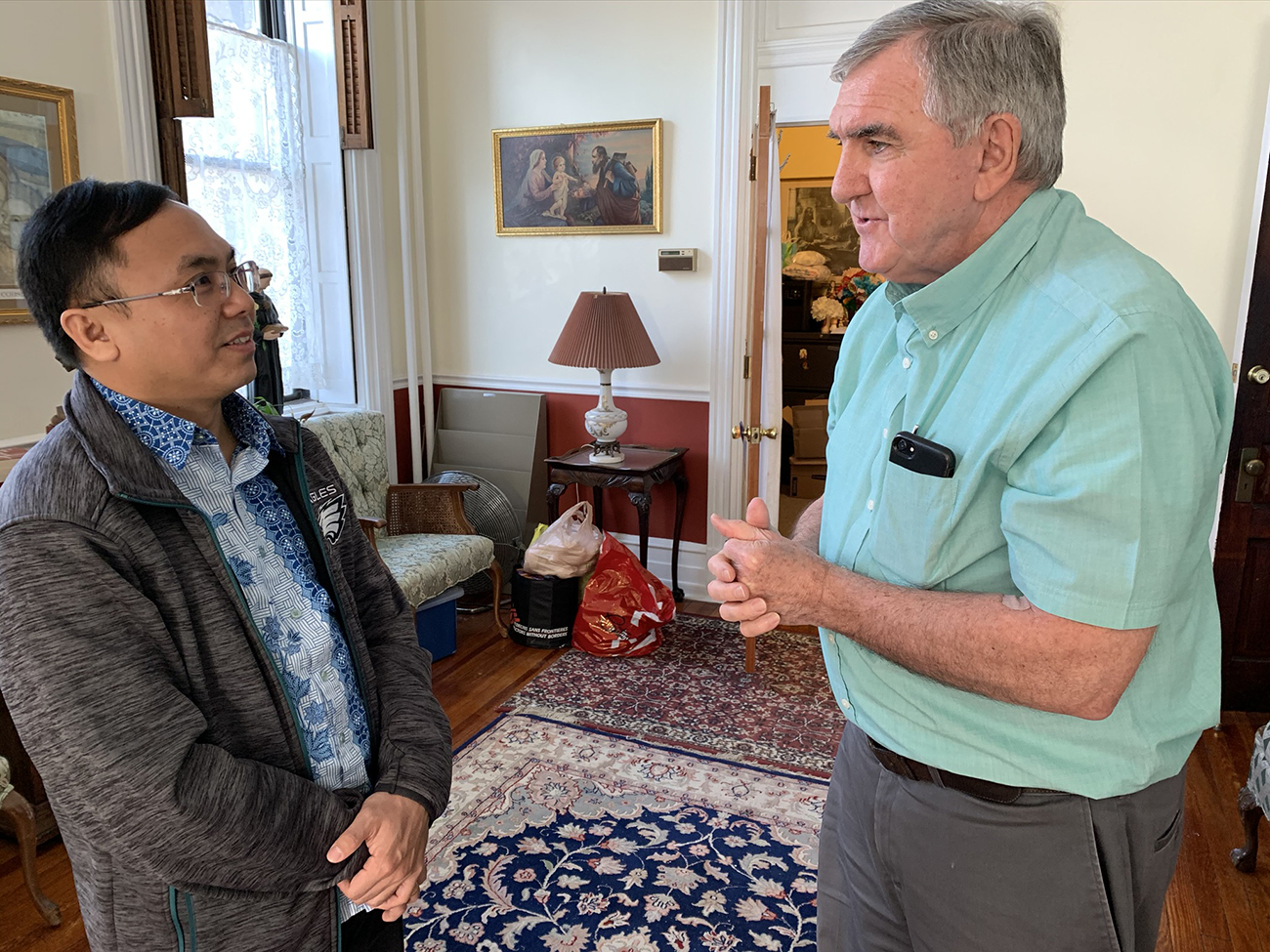
In this Jan. 16 photo, Vincentian Father Kurniawan Diputra counsels a longtime St. Thomas Aquinas parishioner who, along with her husband, is facing deportation to their native Indonesia, which they fled some 20 years ago to escape ethnic and religious persecution. (Photo by Gina Christian)
Teresa, a longtime member of St. Thomas Aquinas Parish in South Philadelphia, was used to her husband Alphonsus telling her to rest – especially after her recent cancer surgery and rounds of intravenous chemotherapy.
So she was content to stay in her nightgown as he left the house last Monday morning for his building maintenance job. But shortly after he’d headed out, she heard the door open. Alphonsus reentered their home in handcuffs, accompanied by Immigration and Customs Enforcement (ICE) officers.
“Get dressed,” one of them said to her.
Teresa asked if she could bring her medications and those of her husband, who suffers from diabetes, high blood pressure and a detached retina.
[hotblock]
The officers were shocked by the number of bottles she gathered before being handcuffed.
“I can’t even miss one hour of a dose,” she explained. “And my husband has a lot of health issues too.”
Within minutes, the Indonesian couple (who have asked CatholicPhilly.com to withhold their actual names) found themselves at ICE’s Philadelphia field office in the city’s Chinatown section.
After being detained for approximately five hours, Teresa was released with an ankle monitor and a restriction not to leave the tri-state area. She will receive a weekly visit at home from ICE officials, and in turn she must also regularly report to the ICE field office.
Alphonsus was transported the next day to ICE’s detention unit at Pike County Correctional Facility, where he remains in custody.
Harrowing experiences in their homeland
Teresa said she can’t even bring herself to tell family members back in Indonesia, including her in-laws, what happened. Almost 20 years earlier, she and Alphonsus, who met at St. Thomas Aquinas, had separately left the Pacific nation for the religious and economic freedoms of the United States. Arriving on visitor visas, they applied for asylum based on their Chinese ethnicity and Christian faith, both of which endangered them in the Muslim-majority country.
In a December 2019 interview with CatholicPhilly.com, Professor Robert Hefner of Boston University, a noted specialist on minority relations in the Muslim-majority world, said that Indonesia has experienced “some measure of anti-Chinese sentiment for the better part of 500 years.”
The 1998 fall of longtime President Suharto and his New Order regime was marked by rioting in the Chinese neighborhoods of several cities, including Jakarta, the nation’s capital. Some 1,000 were killed as buildings were looted and set ablaze.

A parishioner from St. Thomas Aquinas Parish in Philadelphia, recently detained by ICE, shows the ankle monitor she now wears as she faces possible deportation to her native Indonesia, which she and her husband fled some 20 years ago to escape religious and ethnic persecution. (Gina Christian)
According to a June 10, 1998 article in The New York Times, aid workers also documented “an organized campaign of assaults, gang rapes and killings of ethnic Chinese women” and girls during the uprising.
The current Indonesian government under President Joko Widodo has been making “quiet but sustained efforts” to increase tolerance for religious and ethnic minorities, said Hefner.
However, while “most Indonesian Muslims are moderate,” he said there exists “a solid, well-organized 20%” of that group that “want a Muslim-first approach to citizenship.”
[tower]
For Teresa, three harrowing experiences in particular had prompted her to flee her homeland: a bomb threat during Mass at the Jakarta’s Catholic cathedral, the 1998 rioting after the fall of the Suharto government (during which she had to stay in the house for two weeks), and surviving a dangerous car ride through one of the violent union protests that frequently beset the Pacific nation.
“I no longer felt safe,” she said. “I don’t want to go back.”
Once in the U.S., Teresa and Alphonsus each settled in South Philadelphia, home to a thriving Indonesian Catholic community centered at St. Thomas Aquinas. Introduced by friends, they began dating, with Alphonsus – who was already established in Philadelphia – acting as Teresa’s tour guide to the city. She consented to marry him on the condition he fully embraced his faith.
“I said, ‘If you’re not Catholic, I don’t want to marry you,’” she recalled during a Jan. 16 interview at the parish’s rectory.
Complex, confusing process
Despite the support of the parish, the Indonesian Catholic community and Alphonsus’ employer, the couple’s numerous attempts to obtain asylum were denied. Their initially separate cases were merged by an immigration judge after they wed, and they continued to slog through the complex and often confusing legal process faced by those seeking asylum.
[hotblock2]
After their case was rejected by the Third Circuit Court of Appeals in 2007, they remained in the U.S. – working, paying taxes and hoping to find a way to remain in the nation they now called home. In 2010, the couple turned themselves into ICE and were placed on an order of supervision, which enabled them to obtain employment authorizations.
Unfortunately, the company for which Alphonsus had been working was sold that same year. He managed to find a new employer, but the couple’s request to extend their stay of removal was denied in November 2011, and they could not renew their work cards.
Although they asked the court to reconsider the decision, the couple’s immigration status became murky at that point, said Philadelphia-based attorney Christopher Casazza, who recently began representing the couple.
“At that time, it was not uncommon for ICE to (advise) individuals on an order of supervision to just stop reporting and to tell them, ‘Nobody is going to look for you,’” wrote Casazza in a Jan. 16 email to CatholicPhilly.com.

Vincentian Father Kurniawan Diputra, chaplain of the archdiocesan Indonesian Catholic community, and Msgr. Hugh Shields, pastor of St. Thomas Aquinas Parish in Philadelphia, discuss the recent ICE detention of a second Indonesian-Catholic couple in the parish, Jan. 16. (Gina Christian)
Casazza — who could not confirm if Teresa and Alphonsus had received similar direction from ICE – has filed motions to reopen the couple’s case and to stay their removal. He’s seeking to have the immigration appeals board grant the requests within the next several days, before ICE removes Alphonsus from the U.S.
‘We just want freedom’
In the meantime, Teresa said she is relying on her faith, the St. Thomas Aquinas community, and the support of another Indonesian couple in the parish who were released from ICE detention in December.
“They shared with me how to set up an account for making phone calls to the prison,” she said.
Vincentian Father Kurniawan Diputra, chaplain of the archdiocesan Indonesian-Catholic apostolate, said that he has learned from that previous couple’s experiences in ICE detention. He has reached out to the archdiocesan Office for Pastoral Care of Migrants and Refugees, community leaders and elected officials to advocate on behalf of those who “bring everything they have to serve the church and the community.”
“People come here to find a better future,” he said. “Everyone has a right to that. I know these people, and they work very hard here, going to church, following the rules, paying taxes.”
[hotblock]
He added that those who have already been blessed with “a good life” should in turn “show empathy for and stand in solidarity with those who are still struggling.”
Msgr. Hugh Shields, pastor of St. Thomas Aquinas, said that “broken immigration laws” have placed many of his parishioners, particularly in the Hispanic and Indonesian communities, in a “no-win situation.”
“There’s a law that we follow that requires love of God and love of our fellow man,” he said. “We need to put that into practice a little bit better in these circumstances.”
For Teresa, the issue is also one of sheer human need.
“We just want freedom,” she said, speaking through tears.
PREVIOUS: Catholic Charities Appeal ‘gives hope to all’ in 2020
NEXT: After 34 years, still much to learn from Dr. King to heal racial divide


Share this story